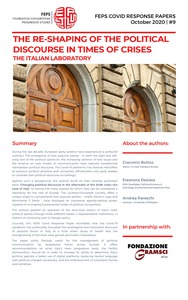The re-shaping of the political discourse in times of crisis: the Italian laboratory

Bottos, Giacomo ; Desiata, Eleonora ; Pareschi, Andrea
Foundation for European Progressive Studies, Brussels
FEPS - Brussels
2020
19 p.
epidemic disease ; political development
FEPS Covid Response Papers
October 2020-#9
Politics
English
Bibliogr.
"In this FEPS Covid Response Paper #9, the authors build on the recent book “Changing political discourse in the aftermath of the 2008 crisis: the case of Italy” published by FEPS and Fondazione Gramsci, to outline the reasons for which Italy can be considered a laboratory for the rest of Europe in terms of political discourse. The southern-European country offers a unique angle to comprehend how populist parties – chiefly Salvini's Lega and Movimento 5 Stelle – have displayed an impressive agenda-setting power, capable of re-shaping fundamental nodes of political competition.
During the last decade, European party systems have experienced a profound overhaul. The emergence of new populist parties – in both the right and left-wing side of the political spectrum, the increasing salience of new issues and the reliance on new modes of communication have radically transformed mainstream political discourse. The Covid-19 pandemic has likewise reshuffled all previous political priorities and compelled officeholders and party leaders to calibrate their political discourse accordingly.
The authors present an appraisal of the discursive stance of Italy's main political parties through three different lenses: i) representative institutions, ii) notions of citizenship and iii) foreign policy.
Crucially, this FEPS Covid Response Paper elucidates how the Covid-19 pandemic has profoundly disrupted the sovereignist and nationalist discourse of populist forces in Italy at a time when issues of health and the strengthening of the state have gained prominent importance.
The paper yields findings useful for the management of political communication by progressive forces across Europe. It offers recommendations on what Italy's main progressive party, the Partito Democratico, should do in order to increase its ability to determine Italy's political agenda: a better use of digital platforms, replacing neutral language with political-charged vocabulary, and the embracement of consistent frames and narratives."
Digital
The ETUI is co-funded by the European Union. Views and opinions expressed are however those of the author(s) only and do not necessarily reflect those of the European Union or the ETUI.